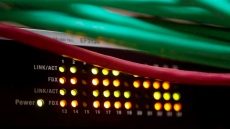CALGARY — Automakers and fuel cell developers say the hydrogen-powered age is almost here — again.
Hyundai now has a hydrogen-fuelled vehicle available in Canada, and Toyota wants to introduce theirs here too, while Canadian fuel cell developers that include Ballard Power Systems and Hydrogenics have been busy putting their product in everything from trains to buses and forklifts.
A fuel cell produces electricity through a chemical reaction, but without combustion. It converts hydrogen and oxygen into water, and in doing so, creates electricity.
"There has been a big change, particularly in the past year," said Eric Denhoff, president of the Canadian Hydrogen and Fuel Cell Association.
But this is hardly the first time proponents have been excited about the technology.
Back in the late '90s, the world's carmakers made big promises that they would soon mass-produce cars that would emit nothing more than water vapour as exhaust.
Vancouver's Ballard and Mississauga's Hydrogenics rode that wave of excitement, with their stock prices climbing into the hundreds of dollars.
Those lofty expectations of the world's cars running on Canadian fuel cells, however, came crashing down, along with the companies' share prices, as the cars failed to materialize.
"In the auto industry, we're really good at selling visions of the future," said Stephen Beatty, vice president, corporate at Toyota Canada.
He said two forces conspired against the hopes of automakers — the technology wasn't perfected, and consumers were unwilling to pay the high prices, putting the move towards hydrogen-fuelled vehicles on hold for years.
But he said advancements in on-board computers, electric motors, higher-pressure systems and general cost-cutting have made fuel cell cars ready for commercial production.
"I think we're at that stage where we're able to offer consumers a reliable and very conventional-feeling piece of technology," said Beatty.
Toyota's Mirai fuel cell car is currently selling in California for US$57,500, has a range of over 500 kilometres on a full tank, and fuels up in three to five minutes.
The company is betting on fuel cells as the long-term solution to an emissions-free vehicle because they offer more range, faster refuelling, better performance in the cold and overall lower costs than battery-powered cars, said Beatty.
But while the company wants to bring the car to Canada, a lack of hydrogen fuelling infrastructure is an issue, he said.
Hyundai has taken a different approach, last year bringing six of its Tucson SUVs to drivers living near a single hydrogen refuelling station in Surrey, B.C.
And earlier this month the company, which is leasing the vehicles for $599 a month including fuel, found their first Ontario customer when Hydrogenics' chief technology officer signed on for one.

Daryl Wilson, chief executive of Hydrogenics, said the fact that someone at the company is driving to work in a fuel cell vehicle shows their time has come.
And while the technology has helped make that possible, he said more environmental awareness is also helping make the shift.
"Our values as a society are moving away from fossil fuels; there's broader recognition of the impact of climate change," said Wilson.
He said Canada's fuel cell industry has been in and out of the news as it goes through growing pains, but is emerging with global contracts and customers.
"There's been a constant steady drive to overcome the remaining obstacles to make all of this possible," said Wilson.
"Ballard and Hydrogenics have managed to go through that valley-of-death challenging experience of pioneering new technology, and today we're, both of us, supporting customers all over the world," he said.
The fuel association's Denhoff says that while the industry employs some 2,000 people in Canada and produces about $200 million a year in goods, almost all of it is exported.
"It's funny, we don't use our own products," said Denhoff. "Almost all of that is exported to the U.S., Europe and Asia."
That could change with the recent federal budget setting aside $62.5 million for alternative fuelling infrastructure, including hydrogen refuelling stations.
Hydrogenics has already built 50 hydrogen fuelling stations globally, and Wilson says he's in talks to install stations in Vancouver and Toronto.
But while there are some green shoots of momentum in fuel cells, auto industry analyst Dennis DesRosiers says consumers have been skeptical of the alternative fuelling options.
"The most popular vehicle to this day, and is going to remain that way for decades, is conventional gasoline-fuelled vehicles," said DesRosiers.
He said the most straightforward way for people to reduce emissions is to buy a new car, since the industry has been increasing fuel efficiency by about two per cent a year, and there's still a lot of room for improvement.
"The industry was challenged to increase fuel efficiency and they're doing it; they're doing it with technology that consumers will buy," said DesRosiers.




